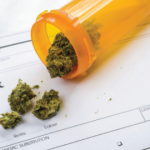NEW YORK (Reuters Health)—High school students with chronic medical conditions who drink alcohol are more likely than their nondrinking peers to forget or skip taking their medications, according to an online survey.
“I was surprised to see such a clear association between alcohol use and medication nonadherence—a finding which really brings home the need to consider substance use risk within the context of disease management and specialty care,” Dr. Elissa R. Weitzman, from Boston Children’s Hospital, told Reuters Health by email.
About a quarter of U.S. youth have a chronic medical condition, and alcohol and marijuana use is prevalent in this age group, but little has been known about how the use of these drugs influences their health and treatment outcomes.
Dr. Weitzman and colleagues used a browser-based survey to assess alcohol use knowledge, behaviors, and health care interactions, as well as marijuana use, in 403 youth (ages 9 to 18 years) who were receiving care for a chronic medical condition.
Almost a third of the entire sample (30.8%) and 36.5% of high school youth reported alcohol use in the past year. One-sixth of the entire sample (17.2%) and 20.6% of high school youth reported marijuana use in the past year.
Among high school youth, binge drinking was associated with better mental health, whereas marijuana use was negatively associated with mental health.
More than half of high school youth with diabetes, inflammatory bowel disease, arthritis, or cystic fibrosis correctly responded that alcohol can interfere with medications, and 37.2% answered correctly that it could interfere with laboratory test results. Only 27% answered both questions correctly, according to the Aug. 31 Pediatrics online report.
Youth who incorrectly answered the medication interaction question were 8.53 times as likely to drink and 4.46 times as likely to binge drink as youth who correctly answered that question.
High school youth who reported drinking in the past year were 79% more likely to report they forgot to take their medications and 61% more likely to report skipping their medications “always/often/sometimes” over the past 30 days, compared with youth who reported not drinking in the past year.
“We are in the infancy of studying this topic and have little information to guide us regarding the effectiveness of substance use prevention programs for youth with chronic illness,” Dr. Weitzman said.
“Having said that, the work we are doing suggests that this group of youth is deeply curious about these issues, desirous of factual and specific information about how alcohol and other substances affect their health and disease, and committed to being healthy and complication-free. This gives us a general landscape or topographical map on which to start building and testing models of preventive intervention for integration into care settings,” she added.
“Physicians should be aware that adolescents with chronic illnesses are using alcohol and other substances (they are not immune),” Dr. Weitzman concluded. “And, when they do, they are at considerably elevated risk for treatment nonadherence, which is a key predictor of poor disease outcomes. We strongly recommend screening these youth for alcohol and other substance use, and there are many excellent tools out there for structured screening.”
Kenneth Lee, from the University of California, Irvine, is a social science researcher who examines the links between education and health. He told Reuters Health by email, “From a social science researcher’s perspective, I would have liked to see if these findings hold up with a larger sample size, a longitudinal design, and more rigorous statistical methods that would reduce bias and take steps toward causality.”
“The more pressing issue for these adolescents is not a form of intervention but rather prevention—understanding where, when, and with whom adolescents are participating in substance use,” Lee said.
“My recently published paper shows that substance use in mid to late adolescence is strongly associated with different out-of-school time contexts and in particular, unsupervised time with peers. It is perhaps possible that reducing unsupervised time with peers in the out-of-school time environment may have positive impacts in reducing substance use,” he said.
The National Institutes of Health funded this study. The authors reported no disclosures.


